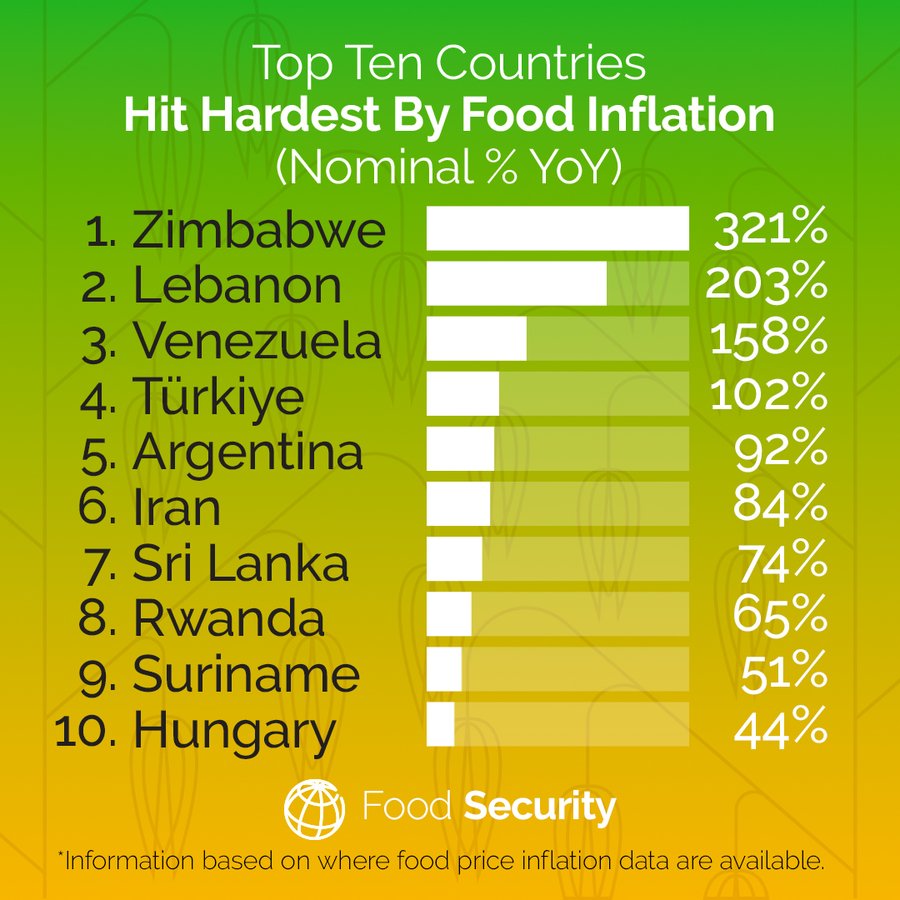Change language:
Bad news: food price rises in Hungary in the World Bank’s TOP 10 list

Hungary has been added to the list of countries with the fastest rising food prices, according to World Bank data. Suriname and Rwanda are close behind Hungary in the top ten. The World Bank published the top ten list of the world’s fastest rising food prices by country on its Twitter page on 26 December.
Domestic food price inflation remains high worldwide. Data for the period August to November 2022 show high inflation in almost all low- and middle-income countries. 88.2 percent of low-income countries, 90.7 percent of lower-middle-income countries and 93 percent of upper-middle-income countries have inflation above 5 percent, wrote index.hu.
“We are the 10th worst food inflation hit country in the world. Yes, we are ahead of even Ukraine, which is at war,”
MSZP MP Zoltán Vajda said on his Facebook page.

The World Bank analysis shows that the rate of high food inflation in high-income countries has risen to 81.8 percent. The most affected countries are in Africa, North America, Latin America, South Asia, Europe and Central Asia.
The government wanted to help earlier
It takes a unique problem in the priority countries to make the top ten list. There were many factors that contributed to Hungary finishing in the TOP10, two of them are the drought and the introduction of the price cap. The government wanted to offer solutions to prevent the noticeable and high-impact changes in the Hungarian economy.
Weak productivity in the domestic food industry seemed to be the greatest problem in July and August 2022. The drought was even visible from the space. In that one-year-period, it has caused a 25 percent drop in wheat harvest and destroyed a significant part of maize in eastern and central Hungary. State-owned irrigation facilities got extra support to pay their increased energy costs, the minister of agriculture said. Additionally, animal breeders were offered a support for the acquisition of animal feed.

Another help by the government was to introduce the price cap to prevent basic foodstuffs’ price increase. As we wrote earlier, according to the agricultural economist György Ráskó, the weak forint has played a role in the soaring food prices. This is because Hungarian producers can sell their products on the world market for euros or dollars. Farmers are better off if they get other currency for their products than Hungarian forints. However, with the time passing, supermarkets and shops had to cover the price-cap-caused deficits by increasing the prices of other groceries. Therefore, the government’s help just worsened the crisis.
Reasons for the food prices
The Russian-Ukrainian conflict has pushed up food prices around the world. Several factors explain the high domestic food inflation, which differs from the international pattern:
- Dynamic wage increases have also driven up labour costs for food companies.
- The upward impact of the NETA (tax on unhealthy products) and the increase in VAT was passed on to the prices.
- The increase in consumption provided scope for over-pricing.
- Substitute products have seen significant price increases due to food price caps. Following the phasing out of the price caps, an inflationary impact may persist.
- Weak productivity in the domestic food industry also contributed.
- Energy prices and high transport costs indirectly contribute to the rise in food prices.
- In the case of imported products, companies passed on the impact of the drop in exchange rates to consumer prices.
Source: index.hu








If I were in Viktor Orbán’s shoes, I would die of shame. Is this the way to govern a modern day European country?
OK, he can’t control the weather (but neither can Zelenskiy), having said that he has total and full control of everything else, so he should be doing a much better job.
I feel bad about seeing Hungary in this particulat Top 10 listed with countries like Zimbabwe, Venezuela and Lebanon. SHAME!